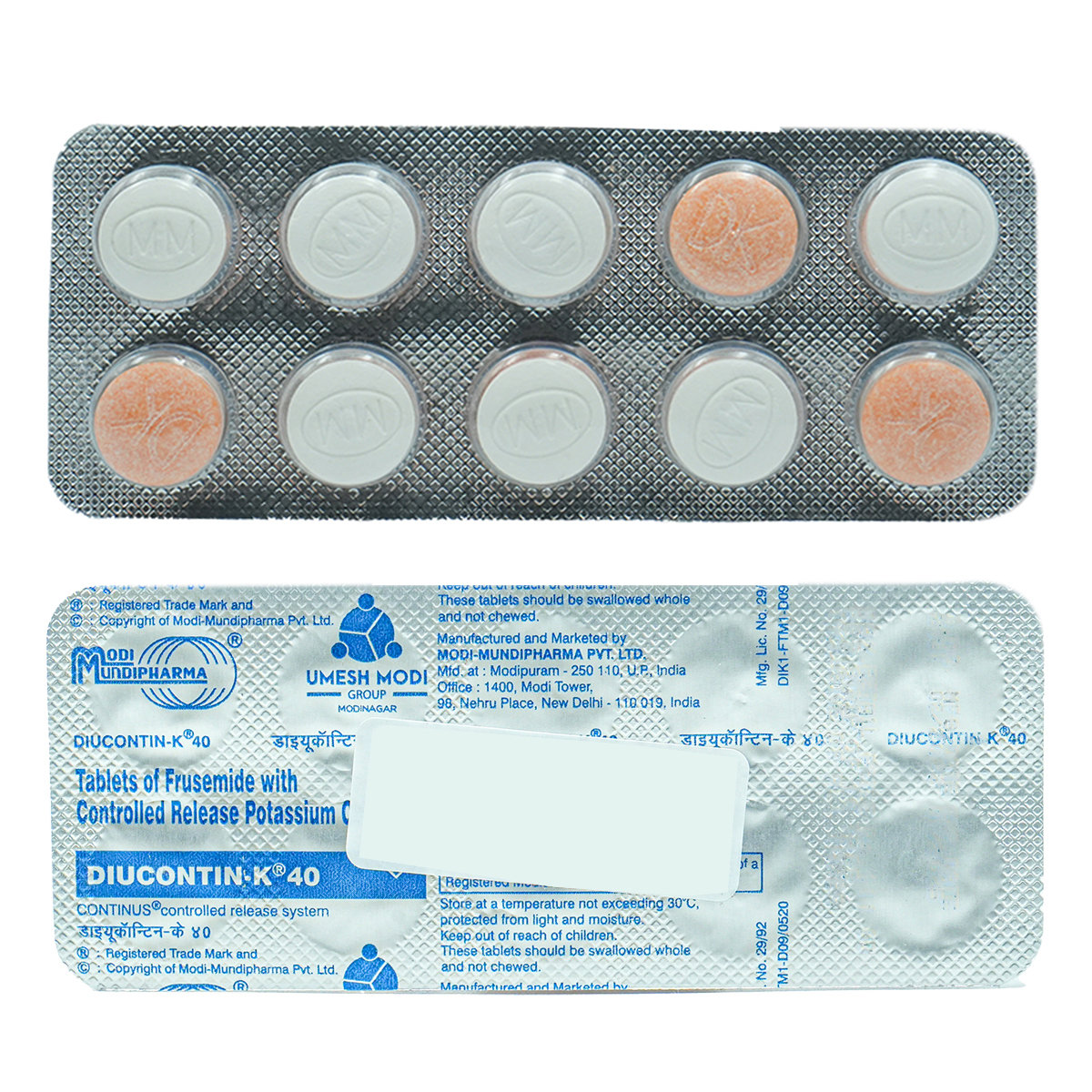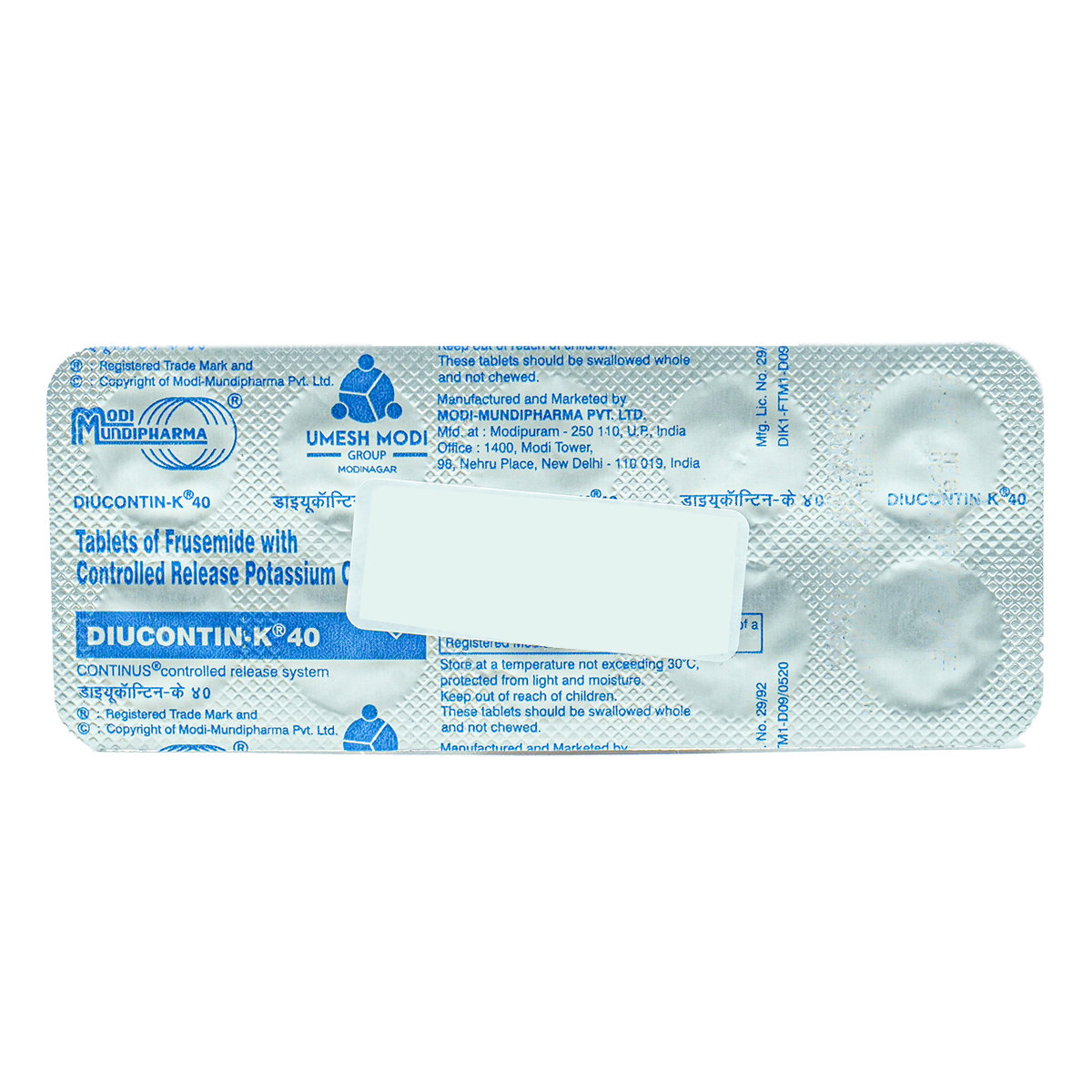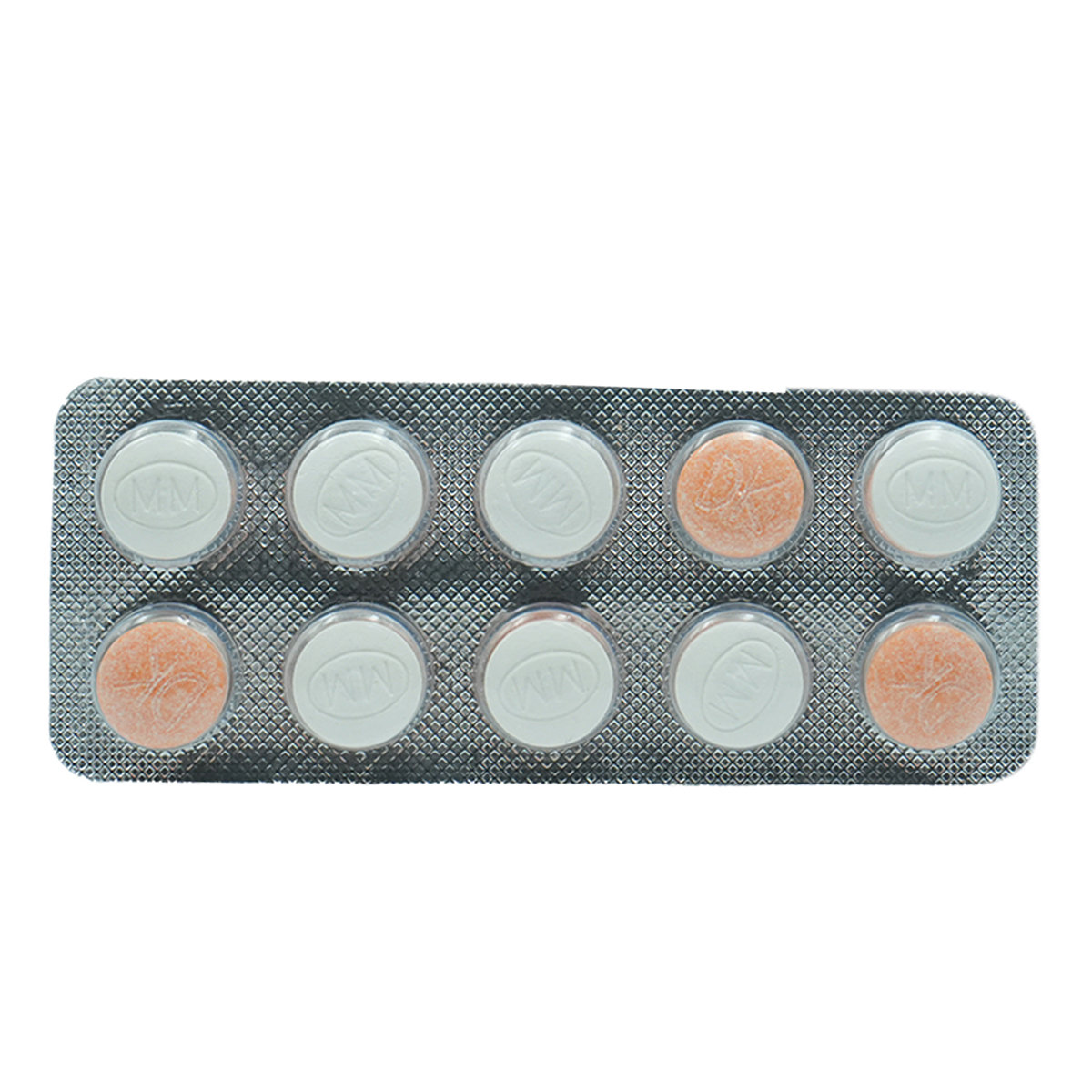Diucontin K 40 Tablet 10's



MRP ₹125.5
(Inclusive of all Taxes)
₹18.8 Cashback (15%)
Know Your Delivery Time
Provide Delivery Location

Secure Payment

India's Most Trusted Pharmacy

Genuine Products
Composition :
Manufacturer/Marketer :
Consume Type :
Return Policy :
Expires on or after :
About Diucontin K 40 Tablet
Diucontin K 40 Tablet belongs to a group of medicines called diuretics (which increase the production of urine) and is primarily used to treat edema. A condition in which the swelling occurs when too much fluid becomes trapped in the tissues of the body, particularly the skin. Many possible causes of edema include heart failure, kidney failure, liver diseases and also by certain medications.
Diucontin K 40 Tablet contains furosemide and potassium chloride. Furosemide is a diuretic that removes extra water and certain electrolytes from the body by increasing the amount of urine produced. In doing so, it causes potassium loss. Potassium chloride is a mineral supplement added to prevent low levels of potassium in the blood. Thus Diucontin K 40 Tablet improves the fluid overload associated with kidney, liver, heart diseases and also prevents the loss of potassium.
You can take Diucontin K 40 Tablet with food or without food. It should be swallowed whole with a glass of water. Do not chew, bite, or break it. Your doctor will advise you on how often you take your tablets based on your medical condition. In some cases, you may experience nausea, vomiting, diarrhoea, flatulence, stomach pain, and dehydration. Most of these side effects of Diucontin K 40 Tablet do not require medical attention and gradually resolve over time. However, if the side effects are persistent, reach out to your doctor.
Inform your doctor before stopping the Diucontin K 40 Tablet . Inform your doctor if you are suffering from any kidney or liver or heart disease. If you are pregnant or breastfeeding, please tell your doctor so that the dosage of Diucontin K 40 Tablet can be prescribed accordingly. Please tell your doctor if you had an allergic reaction to Diucontin K 40 Tablet or any other medicine in the past. Reducing the amount of table salt (sodium chloride) in your food often relieves the swelling of the body. Diucontin K 40 Tablet should be used with caution in anuria ( a condition in which the kidney is unable to produce urine), electrolyte imbalance, hearing problem, gastrointestinal lesions, hyperkalemia, and metabolic acidosis.
Uses of Diucontin K 40 Tablet
Diucontin K 40 Tablet used in the treatment of Edema. The detailed uses of Diucontin K 40 Tablet are as follows:
- Treatment of Edema: Diucontin K 40 Tablet helps to treat edema (swelling) associated with cardiac, pulmonary, hepatic, renal, and peripheral conditions of various etiologies.
- Potassium Replenishment and Fluid Management: Diucontin K 40 Tablet helps to replenish potassium levels and reduce fluid overload in the body, alleviating symptoms such as swelling and shortness of breath.

Have a query?
Directions for Use
- Take Diucontin K 40 Tablet with or without food as advised by your doctor.
- It is advised to take Diucontin K 40 Tablet once daily in the morning; however, follow your doctor's recommendation regarding the dosage and duration.
- Swallow Diucontin K 40 Tablet as a whole with a glass of water.
- Do not chew, crush or break it.
Medicinal Benefits
Diucontin K 40 Tablet contains furosemide and potassium chloride belongs to a group of medicines called diuretics (which increase the production of urine) and is primarily used to treat edema. . Furosemide is a diuretic that removes extra water and certain electrolytes from the body by increasing the amount of urine produced. In doing so, it causes potassium loss. Potassium chloride is a mineral supplement added to prevent low levels of potassium in the blood. Thus Diucontin K 40 Tablet improves the fluid overload associated with kidney, liver, heart diseases and also prevents the loss of potassium. Diucontin K 40 Tablet is used in the treatment of cardiac edema, pulmonary edema, hepatic edema, renal edema, and peripheral edema of various etiologies.
How Diucontin K 40 Tablet Works
Storage
- Do not stand up suddenly. Lie down and get up slowly only when you feel better.
- Avoid alcohol and large meals.
- Drink enough water before standing for long periods.
- Exercise regularly; however, avoid exercising in extreme heat.
- Eat small, low-carb meals.
- Wear compression stockings.
- Inform your doctor about dizziness symptoms. They may adjust your medication regimen or prescribe additional medications to manage symptoms.
- Follow your doctor's instructions for taking medication, and take it at the same time every day to minimize dizziness.
- When standing up, do so slowly and carefully to avoid sudden dizziness.
- Avoid making sudden movements, such as turning or bending quickly, which can exacerbate dizziness.
- Drink plenty of water throughout the day to stay hydrated and help alleviate dizziness symptoms.
- If you're feeling dizzy, sit or lie down and rest until the dizziness passes.
- Track when dizziness occurs and any factors that may trigger it, and share this information with your doctor to help manage symptoms.
- Hydrate your body: Drink enough water to prevent dehydration and headaches.
- Calm Your Mind: Deep breathing and meditation can help you relax and relieve stress.
- Rest and Recharge: Sleep for 7-8 hours to reduce headache triggers.
- Take rest: lie down in a quiet, dark environment.
- Cold or warm compresses can help reduce tension.
- Stay Upright: Maintain good posture to keep symptoms from getting worse.
- To treat headaches naturally, try acupuncture or massage therapy.
- Over-the-counter pain relievers include acetaminophen and ibuprofen.
- Prescription Assistance: Speak with your doctor about more substantial drug alternatives.
- Severe Headaches: Seek emergency medical assistance for sudden, severe headaches.
- Frequent Headaches: If you get reoccurring headaches, consult your doctor.
- Headaches with Symptoms: Seek medical attention if your headaches include fever, disorientation, or weakness.
- Skin rash caused by allergies is due to irritants or allergens. Therefore, avoid contact with such irritants.
- Consult your doctor for proper medication and apply an anti-itch medication. Follow the schedule and use the medication whenever needed.
- Protect your skin from extreme heat and try to apply wet compresses.
- Soak in the cool bath, which gives a soothing impact to the affected area.
- Gently massage the affected area using your hands or a massager.
- Light exercises such as walking or climbing stairs may help the muscles return to normal.
- Apply heat/ice to the affected area.
- Drink electrolyte-rich fluids.
- Inform your doctor immediately if you experience ringing, buzzing, or other unusual sounds in your ears after taking medication.
- Schedule an appointment to discuss symptoms and determine if the medication is the cause.
- Your doctor may adjust your treatment plan by changing dosage, switching to a different medication, or stopping the medication.
- Your doctor may recommend sound therapy or relaxation techniques to manage tinnitus symptoms.
- Regularly track symptoms and report changes to your healthcare provider to ensure effective management.
What if I have taken an overdose of Diucontin K 40 Tablet
Drug Warnings
Inform your doctor before stopping the Diucontin K 40 Tablet . Inform your doctor if you are suffering from any kidney or liver or heart disease. If you are pregnant or breastfeeding, please tell your doctor so that the dosage of Diucontin K 40 Tablet can be prescribed accordingly. Please tell your doctor if you had an allergic reaction to Diucontin K 40 Tablet or any other medicine in the past. Reducing the amount of table salt (sodium chloride) in your food often relieves the swelling of the body. Diucontin K 40 Tablet should be used with caution in anuria ( a condition in which the kidney unable to produce urine), hearing problems, electrolyte imbalance, diabetes, gastrointestinal lesions, hyperkalemia, and metabolic acidosis (electrolyte disorder characterized by an imbalance in the body's acid-base balance).
Drug-Drug Interactions
Drug-Drug Interactions
Login/Sign Up
Taking Ziprasidone with Diucontin K 40 Tablet can increase the risk of abnormal heart rhythm.
How to manage the interaction:
Taking Ziprasidone with Diucontin K 40 Tablet is not recommended, but it can be taken together if prescribed by a doctor. However, consult your doctor if you experience sudden dizziness, lightheadedness, fainting, shortness of breath, weakness, tiredness, drowsiness, confusion, muscle pain, cramps, dizziness, nausea, or vomiting. Do not discontinue any medications without consulting a doctor.
Co-administration of Flavoxate with Diucontin K 40 Tablet can increase the risk of stomach ulcers.
How to manage the interaction:
Taking Flavoxate with Diucontin K 40 Tablet is not recommended, as it can lead to an interaction, it can be taken if a doctor has prescribed it. However, if you experience severe stomach pain, bloating, sudden lightheadedness or dizziness, nausea, vomiting (especially with blood), decreased hunger, or dark, tarry stools, consult the doctor immediately. Do not discontinue the medication without consulting a doctor.
Taking Cyproheptadine with Diucontin K 40 Tablet can increase the risk of stomach ulcers.
How to manage the interaction:
Taking Cyproheptadine with Diucontin K 40 Tablet is not recommended, as it can lead to an interaction, can be taken if your doctor has prescribed it. However, if you experience severe stomach pain, bloating, sudden lightheadedness or dizziness, nausea, vomiting (especially with blood), decreased hunger, dark, tarry stools, consult the doctor immediately. Do not stop any medication without talking to a doctor.
Taking Phenindamine and Diucontin K 40 Tablet (in tablet or capsule form) together can increase the risk of stomach ulcers, bleeding, and other gastrointestinal injury.
How to manage the interaction:
Taking Phenindamine with Diucontin K 40 Tablet is not recommended, as it can lead to an interaction, it can be taken if a doctor has prescribed it. However, if you experience severe stomach pain, bloating, sudden lightheadedness or dizziness, nausea, vomiting (especially with blood), decreased hunger, dark, tarry stools, consult the doctor immediately.
Taking Tolterodine and Diucontin K 40 Tablet together can increase the risk of side effects.
How to manage the interaction:
Although there is an interaction between Tolterodine and Diucontin K 40 Tablet, they can be taken if prescribed by a doctor. However, contact a doctor immediately if you develop severe abdominal pain, bloating, sudden dizziness or lightheadedness, nausea, vomiting (especially with blood), or less desire to eat. Do not discontinue medications without consulting a doctor.
Taking Glycopyrrolate with Diucontin K 40 Tablet can increase the risk or severity of ulcers, bleeding, and other gastrointestinal injury.
How to manage the interaction:
Taking Glycopyrrolate with Diucontin K 40 Tablet together is not recommended as it can possibly result in an interaction, it can be taken if a doctor has advised it. However, if you experience sudden dizziness or lightheadedness, nausea, vomiting (especially with blood), loss of appetite, and/or black, tarry stools, contact a doctor immediately. Do not discontinue any medications without consulting a doctor.
Taking Darifenacin with Diucontin K 40 Tablet(oral capsule or tablet) can increase the risk of stomach ulcers.
How to manage the interaction:
Taking Darifenacin with Diucontin K 40 Tablet(oral capsule or tablet) is not recommended, as it can lead to an interaction, it can be taken if your doctor has prescribed it. However, if you experience severe stomach pain, bloating, sudden lightheadedness or dizziness, nausea, vomiting (especially with blood), decreased hunger, dark, tarry stools, consult the doctor immediately. Do not stop taking any medications without doctor's advise.
Taking Chlorpheniramine and Diucontin K 40 Tablet (in tablet or capsule form) together can increase the risk of stomach ulcers, bleeding, and gastrointestinal injury.
How to manage the interaction:
Taking Chlorpheniramine with Diucontin K 40 Tablet it not recommended as it can lead to an interaction, it can be taken if your doctor has prescribed it. However, if you experience any symptoms such as severe stomach pain, bloating, lightheadedness or dizziness, nausea, vomiting (especially with blood), decreased hunger, or dark, tarry stools, consult the doctor. Do not discontinue any medications without a doctor's advice.
Co-administration of Dicyclomine with Diucontin K 40 Tablet can increase the risk of stomach ulcers.
How to manage the interaction:
Taking Dicyclomine with Diucontin K 40 Tablet is not recommended, as it can lead to an interaction, it can be taken if a doctor has prescribed it. However, if you experience severe stomach pain, bloating, sudden lightheadedness or dizziness, nausea, vomiting (especially with blood), decreased hunger, dark, tarry stools, consult the doctor immediately. Do not discontinue the medication without consulting a doctor.
Taking Difenoxin and Diucontin K 40 Tablet (in tablet or capsule form) together can increase the risk of stomach ulcers, bleeding, and other gastrointestinal injury.
How to manage the interaction:
Taking Difenoxin with Diucontin K 40 Tablet is not recommended, as it can lead to an interaction, it can be taken if a doctor has prescribed it. However, if you experience severe stomach pain, bloating, sudden lightheadedness or dizziness, nausea, vomiting (especially with blood), decreased hunger, dark, tarry stools, consult the doctor immediately.
Drug-Food Interactions
Drug-Food Interactions
Login/Sign Up
Diet & Lifestyle Advise
- Keep your weight under control with a BMI of 19.5-24.9.
- Do regular physical activity or exercise for at least 150 minutes per week, or about 30 minutes most days of the week. Doing this can help you to lower your raised blood pressure by about 5 mm of Hg.
- Opt for a diet rich in whole grains, fruits, veggies, and low-fat dairy products.
- Limit intake of sodium chloride (table salt) in your daily diet to 2300 mg per day or less than 1500 mg is ideal for most adults.
- If you are taking alcohol then only one serving for women and two servings for men is advisable.
- Quitting smoking is the best strategy to lower the risk of heart disease.
- Try to include heart-healthy omega 3 fatty acids containing food drinks in your daily diet. You can also use low-fat cooking oil like olive oil, soybean oil, canola oil, and coconut oil can help in lowering your elevated blood pressure.
Habit Forming
Therapeutic Class
All Substitutes & Brand Comparisons
Alcohol
Caution
You are not recommended to consume alcohol along with Diucontin K 40 Tablet to avoid unpleasant side-effects.
Pregnancy
Caution
Diucontin K 40 Tablet should not be used during pregnancy unless clearly necessary. Your doctor will weigh the benefits and any potential risks before prescribing it to you. Please consult your doctor.
Breast Feeding
Caution
Diucontin K 40 Tablet should not be used when breastfeeding unless clearly necessary. Your doctor will weigh the benefits and any potential risks before prescribing it to you. Please consult your doctor.
Driving
Caution
It is not recommended to drive after taking Diucontin K 40 Tablet as it may occasionally cause drowsiness.
Liver
Caution
Diucontin K 40 Tablet to be taken with caution, especially if you have a history of liver diseases/conditions. Your doctor may adjust your dose depending upon your current liver conditions.
Kidney
Caution
Diucontin K 40 Tablet to be taken with caution, especially if you have a history of Kidney diseases/conditions. Your doctor may adjust your dose depending upon your current kidney conditions.
Children
Caution
Diucontin K 40 Tablet to be taken with caution, especially if you are children below the age of 12. Your doctor may adjust your dose depending upon your age.
Heart
Caution
Diucontin K 40 Tablet should be taken with caution in patients with heart problems. Therefore, please inform your doctor before using Diucontin K 40 Tablet .
Geriatrics
Caution
Diucontin K 40 Tablet should be given with caution in elderly patients due to an increased risk of side effects. Please inform your doctor before use.
FAQs
Diucontin K 40 Tablet is used to treat oedema (fluid retention).
Diucontin K 40 Tablet contains furosemide and potassium chloride. Furosemide is a diuretic that removes extra water and certain electrolytes from the body by increasing the amount of urine produced. In doing so, it causes potassium loss. Potassium chloride is a mineral supplement added to prevent low levels of potassium in the blood. Thus Diucontin K 40 Tablet improves the fluid overload associated with kidney, liver, heart diseases and also prevents the loss of potassium.
Diucontin K 40 Tablet cause common side effects like nausea, vomiting, diarrhoea, flatulence, stomach pain, dehydration, decreased sodium level in the blood, decreased magnesium level in the blood, decreased calcium level in the blood, increased uric acid level in blood. Most of these side effects of Diucontin K 40 Tablet do not require medical attention and gradually resolve over time. However, if the side effects are persistent, reach out to your doctor.
Yes, Diucontin K 40 Tablet is contraindicated in people with known allergy to any of the components of Diucontin K 40 Tablet . It should be avoided in people with severe kidney or liver impairment and in people with anuria (reduction or absence of urine), and hyperkalemia.
There's no evidence that Diucontin K 40 Tablet reduces fertility in men or women. However, if you're a woman and you're trying to get pregnant, talk to your doctor first.
Country of origin
Manufacturer/Marketer address
Customers Also Bought
Disclaimer
Author Details
We provide you with authentic, trustworthy and relevant information
Buy best Cardiology products by
Torrent Pharmaceuticals Ltd
Sun Pharmaceutical Industries Ltd
Lupin Ltd
Intas Pharmaceuticals Ltd
Cipla Ltd
Micro Labs Ltd
Macleods Pharmaceuticals Ltd
Abbott India Ltd
Ajanta Pharma Ltd
Ipca Laboratories Ltd
Eris Life Sciences Ltd
Mankind Pharma Pvt Ltd
Lloyd Healthcare Pvt Ltd
Dr Reddy's Laboratories Ltd
Emcure Pharmaceuticals Ltd
Alembic Pharmaceuticals Ltd
Glenmark Pharmaceuticals Ltd
Alkem Laboratories Ltd
Zydus Healthcare Ltd
East West Pharma India Pvt Ltd
USV Pvt Ltd
Aristo Pharmaceuticals Pvt Ltd
Alteus Biogenics Pvt Ltd
J B Chemicals & Pharmaceuticals Ltd
Elbrit Life Sciences Pvt Ltd
Fusion Health Care Pvt Ltd
Eswar Therapeutics Pvt Ltd
La Renon Healthcare Pvt Ltd
Zydus Cadila
Akumentis Healthcare Ltd
Hbc Life Sciences Pvt Ltd
Troikaa Pharmaceuticals Ltd
Knoll Healthcare Pvt Ltd
Corona Remedies Pvt Ltd
Morepen Laboratories Ltd
Shrrishti Health Care Products Pvt Ltd
Prevego Healthcare & Research Pvt Ltd
Lividus Pharmaceuticals Pvt Ltd
Medley Pharmaceuticals Ltd
Cadila Pharmaceuticals Ltd
Jubilant Lifesciences Ltd
Msn Laboratories Pvt Ltd
Zuventus Healthcare Ltd
Steris Healthcare
Ranmarc Labs
Elder Pharmaceuticals Ltd
Tas Med India Pvt Ltd
Unison Pharmaceuticals Pvt Ltd
Primus Remedies Pvt Ltd
Leeford Healthcare Ltd
Blue Cross Laboratories Pvt Ltd
Azkka Pharmaceuticals Pvt Ltd
Sanofi India Ltd
Sinsan Pharmaceuticals Pvt Ltd
Nirvana India Pvt Ltd
Knoll Pharmaceuticals Ltd
Orsim Pharma
Systopic Laboratories Pvt Ltd
Indiabulls Pharmaceuticals Pvt Ltd
RPG Life Sciences Ltd
Biochem Pharmaceutical Industries Ltd
Johnlee Pharmaceuticals Pvt Ltd
Olcare Laboratories Pvt Ltd
Vasu Organics Pvt Ltd
Cadila Healthcare Ltd
Econ Healthcare
Shine Pharmaceuticals Ltd
Xemex Life Sciences
Elicad Pharmaceuticals Pvt Ltd
Elinor Pharmaceuticals (P) Ltd
Sunij Pharma Pvt Ltd
Orris Pharmaceuticals
Atos Lifesciences Pvt Ltd
FDC Ltd
Lia Life Sciences Pvt Ltd
Pfizer Ltd
MEDICAMEN BIOTECH LTD
Nicholas Piramal India Ltd
Astra Zeneca Pharma India Ltd
Lakshya Life Sciences Pvt Ltd
Opsis Care Lifesciences Pvt Ltd
Alvio Pharmaceuticals Pvt Ltd
Biocon Ltd
Finecure Pharmaceuticals Ltd
Glynis Pharmaceuticals Pvt Ltd
Indoco Remedies Ltd
Med Manor Organics Pvt Ltd
Acmedix Pharma Llp
Allysia Lifesciences Pvt Ltd
Chemo Healthcare Pvt Ltd
Pficus De Med Pvt Ltd
Proqol Health Care Pvt Ltd
Divine Savior Pvt Ltd
Enovus Healthcare Pvt Ltd
Ergos Life Sciences Pvt Ltd
Samarth Life Sciences Pvt Ltd
Signova Pharma
ALICAN PHARMACEUTICAL PVT LTD
Auspharma Pvt Ltd
Maxford Labs Pvt Ltd






